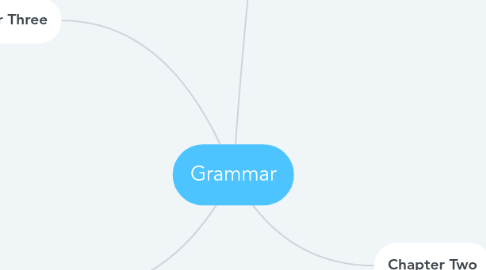
1. Chapter Three
1.1. Adjectives:Words that describe the qualities or states of being of nouns
1.1.1. EX| Many, Few, Silly, Beautiful
1.1.2. EX| There is a beautiful lady.
1.1.3. Order list
1.1.3.1. 1.opinion,2.size,3.physical quality,4.shape,5.age,6.colour,7.origin, 8.material,9.type,10.purpose
1.1.3.1.1. EX| There is a big red boll.
1.2. Adverbs:A word that is used to change or qualify the meaning of an adjective, a verb, a clause, another adverb.
1.2.1. EX| She walks slowly.
1.2.2. EX| She is very smart.
1.3. Why are adjectives and adverbs important?
1.3.1. Adjectives can modify nouns, and adverbs can modify verbs. These two kinds of parts of speech can make the emotion of sentences become more vivid.
2. Chapter Five
2.1. Roots : Generally derived from either Latin and Greek. A part of a word can constitute a root to indicate a meaning
2.1.1. EX| Bio-cycle, cycle representation loop
2.2. Prefixes
2.2.1. Put the root at the beginning of the word and give the word a new meaning.
2.2.1.1. EX| Un-happy, means not happy, (un-) have a opposite mean.
2.3. Suffixes
2.3.1. Put the root at the ending of the word and give the word a new meaning.
2.3.1.1. EX| Work-er, means the person who work there, (-er) means person.
2.4. Why roots and affixes are important
2.4.1. Roots and affixes usually express a specific meaning, adding the beginning or end of a word to change the meaning of the original vocabulary to a specific meaning. Roots and affixes can change the word's part of speech and facilitate the memory of words.
3. Chapter One
3.1. Articles: Words that define a noun as specific or unspecific.
3.1.1. Definite Article : Limits the meaning of a noun to one particular thing.
3.1.1.1. EX| This apple is mine
3.1.2. Indefinite Article : A noun refers to a general idea rather than a particular thing.
3.1.2.1. A : When the first letter of a word is a vowel but is pronounced with a consonant sound
3.1.2.1.1. EX| There is a banana
3.1.2.2. An : When the letter start with consonants and an before words that begin with vowels.
3.1.2.2.1. EX| There is an apple
3.1.3. Do not use articles:Uncountable nouns
3.1.3.1. Intangible : Unable to be touched or grasped
3.1.3.1.1. EX| Light, Air
3.1.3.2. Abstract Nouns : A noun denoting an idea, quality, or state rather than a concrete object.
3.1.3.2.1. EX| Love, Life, Belief
3.2. Prepositions : A word used to link nouns , pronouns , or phrases to other words within a sentence.
3.2.1. Time prepositions
3.2.1.1. EX| After, Before
3.2.2. Place prepositions
3.2.2.1. EX| Between, Next
3.2.3. Direction prepositions
3.2.3.1. EX| Up, down
3.3. Why articles and prepositions are important for us?
3.3.1. The preposition is important because of its high frequency of use and wide application. It can connect nouns to indicate the relationship between two things in a certain state. Definite articles is important because it usually refer to some specific objects.
4. Chapter Two
4.1. Verb Tenses
4.1.1. Past Tense is used to describe things that have already happened.
4.1.1.1. Simple
4.1.1.1.1. EX| Last night, I listened to music.
4.1.1.2. Present
4.1.1.2.1. EX| I was reading last night.
4.1.1.3. Prefect
4.1.1.3.1. EX| I had played 20 video games before the end of 2015.
4.1.1.4. Prefect Continous
4.1.1.4.1. EX| I had been playing this game for at least 3 years.
4.1.2. Present Tense is used to describe things that are happening right now, or things that are continuous.
4.1.2.1. Simple
4.1.2.1.1. EX| I read every day.
4.1.2.2. Continous
4.1.2.2.1. EX| I am reading now.
4.1.2.3. Prefect
4.1.2.3.1. EX| Till now, I have so many books.
4.1.2.4. Prefect Continous
4.1.2.4.1. EX| I have been reading since I was five years old.
4.1.3. Future Tense describes things that have yet to happen.
4.1.3.1. Simple
4.1.3.1.1. EX| I will stay at home tomorrow.
4.1.3.2. Continous
4.1.3.2.1. EX| I will be reading this book soon.
4.1.3.3. Prefect
4.1.3.3.1. EX| I will have finished this book in the end of May.
4.1.3.4. Prefect Continous
4.1.3.4.1. EX| I will have been playing for at least 1 hour before dinner tonight.
4.2. Irregular Forms
4.2.1. Not in accordance with the prescribed form of morphological changes
4.2.1.1. EX| begin,begins,began,begun,beginning
4.3. Why verb tenses and Irregular forms are important?
4.3.1. The verb tenses are important because they can distinguish and express the difference in the timing and manner of an action. The irregular form is that the past tense and the last participle of a word that does not have the same verb as the conventional verb are formed with -ed at the end of the word. When the end is e, only d is added, and when the end is y, y is changed to ied. If you make a mistake, you will get a syntax error.

